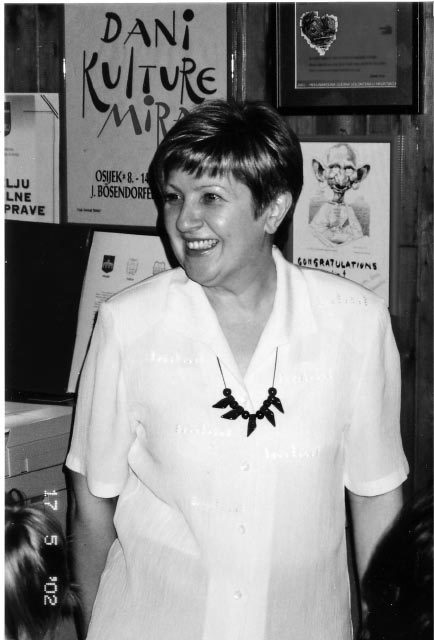Published 16.02.2024. | Željka Geto

It is with sadness and respect that we say goodbye to our dear friend, the peacemaker, one of the first and long-term active and dedicated members of the Centre for Peace, Spasenija Moro, our Spasa.
Spasenija Moro was born on September 7, 1948 in Sombor, where she attended elementary school and high school. SHe finished studying German studies at the Faculty of Philology in Belgrade in 1972.
From her first job at the technical school in Apatin until her retirement, Spasenija taught German language and literature successfully and with the joy of an authentic pedagogue - at the gymnasium and economic school in Novska (where she moved after her marriage); in I.L. Ribar High School and electrical engineering school in Osijek (1977); since 1978 at the Faculty of Education; from 1993 until his retirement in 2011, as a senior lecturer, he taught at the Faculty of Food and at the Department of Chemistry of Josip Juraj Strossmayer University in Osijek. She is the author of two German language textbooks in food technology (Deutsch in der Lebensmitteltehnologie) 1 and 2 (1988) with two updated editions in 2011 and 2012.
Deeply shaken and troubled by the suffering of people in the Homeland War and the disastrous consequences of war on people's existential needs and on social trust and connection, Spasenija joined a small group of intellectuals who in 1992 started the Center for Peace, Nonviolence and Human Rights in war-torn Osijek. From the first meeting, for three decades we have been walking and working together to contribute to the reduction of trauma and the post-war construction of sustainable peace and a democratic society based on a culture of non-violence.
Peace work begins with the question Spasenija asked herself: WHAT CAN I DO FOR THE RECOVERY OF PEOPLE AND FOR PEACE. Her answers were steps in long-term peace activities that reached a large number of people and young people.
Thus, she turned her friendship with Manda Prišing from Sombor and her colleague Svjetlana Nenadović from Bilje (then under the control of Serbian forces and UMPROFOR) into opening communication and cooperation with peace initiatives on the other side of the line on the processes of peaceful reintegration of the Croatian Danube region (which, due to the contribution of peace the initiative becomes one of the most successful UN peacekeeping missions ever).
Immediately after the Bljesak operation, she visited Pakrac and launched the project "Return and restoration of trust - Pakrac (1996-2001). As part of the Peace Building and Community Development program in Pakrac and several settlements in Baranja, he works with individuals and groups to restore trust and establish communication between members of the local community and empower them to return and create minimum economic conditions for community development. The first families returned to Pakrac already in 1998. An overview of all the numerous activities on this project was published in two bulletins in the form of a periodical newspaper - entitled "Return and renewal of trust - Pakrac".
With the peaceful logic of responding to perceived needs and opportunities for post-war recovery, Spasenija initiates the project Children's Summer in Živogošće (1997 - 2001). Over 200 school children (6th-7th grade) from the villages and towns of eastern Croatia received psychosocial support there. Every year, the summer vacation is free at the resort in Živogošće; in two shifts, about 20 teachers in addition to sports and social activities and learning German and English.
Spasenija Moro was the bearer of peace cooperation and contacts with foundations from Germany and Switzerland; translator at the Center for Peace for the German language and participated in the planning and realization of other peace activities - the Week of the Culture of Peace, the Intellectual Forum, the Peace Forum.
She continuously and persistently participated in the joint reflection and organization of the work and activities of the Center for Peace, and in one term she was the president.
Spasenija brought her composure, responsibility, time, effort and heart to the peace-making work with people and for people. Brave when peacemaking required it, and always critical and questioning. In 2005, the Croatian Women's Network nominated six Croatian peace activists for the Nobel Peace Prize, among whom was Spasenija Moro.
We are shaken by the loss of our Savior because we are left without a part of the Center. But what the Center for Peace is today and what will be in our lives and the lives of many to whom Salvation has reached is our common legacy. We will take care of her!
We will remember our dear peacemaker friend Spasenija Moro - Spasa with joy, respect and gratitude!
Members of the Centre for Peace Osijek